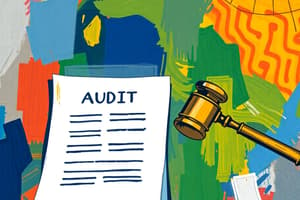Podcast
Questions and Answers
What is the primary purpose of ethical rulings?
What is the primary purpose of ethical rulings?
- To summarize annual performance reviews
- To interpret ethical requirements and provide guidance (correct)
- To provide disciplinary actions for professionals
- To establish new rules of conduct
Who typically submits questions that lead to ethical rulings?
Who typically submits questions that lead to ethical rulings?
- Charitable organizations
- The executive committee of the AICPA
- Members of the public
- Professionals interested in ethical requirements (correct)
What happens if a firm partner serves as a director of a federated fund-raising organization?
What happens if a firm partner serves as a director of a federated fund-raising organization?
- Independence is enhanced because of community service
- Independence is considered to be impaired (correct)
- Independence is only impaired if the director is paid
- Independence is maintained under all circumstances
Where can a large number of ethical rulings be found?
Where can a large number of ethical rulings be found?
What does the example in Ruling No. 14 illustrate regarding independence?
What does the example in Ruling No. 14 illustrate regarding independence?
What is the primary purpose of the introductory paragraph in a standard unqualified audit report?
What is the primary purpose of the introductory paragraph in a standard unqualified audit report?
Which of the following correctly describes the scope paragraph in a standard unqualified audit report?
Which of the following correctly describes the scope paragraph in a standard unqualified audit report?
When would a standard unqualified audit report not be issued?
When would a standard unqualified audit report not be issued?
In the context of a standard unqualified audit report, what does the opinion paragraph signify?
In the context of a standard unqualified audit report, what does the opinion paragraph signify?
What are the two primary reasons why people act unethically?
What are the two primary reasons why people act unethically?
What does PCAOB Auditing Standard 5 require concerning the audit of internal control?
What does PCAOB Auditing Standard 5 require concerning the audit of internal control?
Which of the following statements about the fourth paragraph in an unqualified audit report is true?
Which of the following statements about the fourth paragraph in an unqualified audit report is true?
Which of the following best defines an ethical dilemma?
Which of the following best defines an ethical dilemma?
What is a standard unqualified audit report often referred to as?
What is a standard unqualified audit report often referred to as?
What is one example of a simple ethical dilemma?
What is one example of a simple ethical dilemma?
How does the scope paragraph of an unqualified audit report inform stakeholders about the audit process?
How does the scope paragraph of an unqualified audit report inform stakeholders about the audit process?
What can complicate the resolution of an ethical dilemma?
What can complicate the resolution of an ethical dilemma?
What is the purpose of a formal framework for resolving ethical dilemmas?
What is the purpose of a formal framework for resolving ethical dilemmas?
How do CPA firms differ from other professionals in their relationship with users of financial statements?
How do CPA firms differ from other professionals in their relationship with users of financial statements?
What might lead a businessperson to face an ethical dilemma regarding client expectations?
What might lead a businessperson to face an ethical dilemma regarding client expectations?
Which situation illustrates a more complex ethical dilemma?
Which situation illustrates a more complex ethical dilemma?
What does the term 'material' imply about an auditor's responsibility in searching for misstatements?
What does the term 'material' imply about an auditor's responsibility in searching for misstatements?
How does the concept of 'reasonable assurance' relate to an audit's effectiveness?
How does the concept of 'reasonable assurance' relate to an audit's effectiveness?
Which of the following is NOT a focus during an auditor's evaluation of a company's internal control?
Which of the following is NOT a focus during an auditor's evaluation of a company's internal control?
What is typical about the auditor's opinion stated in the final paragraph of the audit report?
What is typical about the auditor's opinion stated in the final paragraph of the audit report?
Why is the phrase 'in our opinion' important in the auditor's report?
Why is the phrase 'in our opinion' important in the auditor's report?
When evaluating accounting policies, what does the auditor need to consider?
When evaluating accounting policies, what does the auditor need to consider?
What aspect does the audit not cover regarding internal control?
What aspect does the audit not cover regarding internal control?
What is one of the implications of the auditor's opinion regarding financial statements?
What is one of the implications of the auditor's opinion regarding financial statements?
What does an adverse audit report typically indicate?
What does an adverse audit report typically indicate?
Which statement best describes a qualified opinion?
Which statement best describes a qualified opinion?
When must the term 'except for' be used in an audit opinion?
When must the term 'except for' be used in an audit opinion?
What defines an adverse opinion in relation to the financial statements?
What defines an adverse opinion in relation to the financial statements?
What can cause an auditor to issue a qualified opinion report?
What can cause an auditor to issue a qualified opinion report?
Which of the following statements about adverse opinions is true?
Which of the following statements about adverse opinions is true?
What does the severity of an adverse opinion suggest about a company's financial records?
What does the severity of an adverse opinion suggest about a company's financial records?
Which type of opinion is considered the least severe?
Which type of opinion is considered the least severe?
What is a Disclaimer of Opinion issued by an auditor?
What is a Disclaimer of Opinion issued by an auditor?
Under what circumstance does an auditor issue an adverse opinion?
Under what circumstance does an auditor issue an adverse opinion?
How does a disclaimer differ from an adverse opinion?
How does a disclaimer differ from an adverse opinion?
What role do ethics play in a functional society?
What role do ethics play in a functional society?
Why might an auditor choose to issue a disclaimer of opinion concerning a going concern problem?
Why might an auditor choose to issue a disclaimer of opinion concerning a going concern problem?
What does unethical behavior typically involve?
What does unethical behavior typically involve?
Which of the following can serve as ethical guidelines?
Which of the following can serve as ethical guidelines?
What is a common reason people might act unethically?
What is a common reason people might act unethically?
Flashcards
Standard unqualified audit report
Standard unqualified audit report
A clean audit opinion issued when no issues require modifying the auditor's opinion.
Requirements of a standard unqualified report
Requirements of a standard unqualified report
Four criteria that must be met to issue a standard unqualified audit report for public companies.
Public company audit report structure
Public company audit report structure
The audit report has three paragraphs for the financial statements and possibly a fourth paragraph for internal control.
Introductory paragraph
Introductory paragraph
Signup and view all the flashcards
Scope paragraph
Scope paragraph
Signup and view all the flashcards
Opinion paragraph
Opinion paragraph
Signup and view all the flashcards
Internal control report (separate)
Internal control report (separate)
Signup and view all the flashcards
Combined report on financial statements and internal control
Combined report on financial statements and internal control
Signup and view all the flashcards
Audit objective
Audit objective
Signup and view all the flashcards
Material Misstatement
Material Misstatement
Signup and view all the flashcards
Reasonable Assurance
Reasonable Assurance
Signup and view all the flashcards
Audit Procedure Scope
Audit Procedure Scope
Signup and view all the flashcards
Sufficient Appropriate Evidence
Sufficient Appropriate Evidence
Signup and view all the flashcards
Auditor's Opinion
Auditor's Opinion
Signup and view all the flashcards
Internal Control Assessment
Internal Control Assessment
Signup and view all the flashcards
"Present Fairly"
"Present Fairly"
Signup and view all the flashcards
Adverse Audit Report
Adverse Audit Report
Signup and view all the flashcards
Qualified Opinion
Qualified Opinion
Signup and view all the flashcards
Qualified Opinion Scope Limitation
Qualified Opinion Scope Limitation
Signup and view all the flashcards
Qualified Opinion vs Opinion Departure
Qualified Opinion vs Opinion Departure
Signup and view all the flashcards
Adverse Opinion
Adverse Opinion
Signup and view all the flashcards
Exception Clause in Qualified Opinion
Exception Clause in Qualified Opinion
Signup and view all the flashcards
Key Difference between Qualified and Adverse Opinions
Key Difference between Qualified and Adverse Opinions
Signup and view all the flashcards
GAAP
GAAP
Signup and view all the flashcards
Ethical Dilemma
Ethical Dilemma
Signup and view all the flashcards
Unethical Behavior
Unethical Behavior
Signup and view all the flashcards
Ethical Standards
Ethical Standards
Signup and view all the flashcards
Selfish Behavior
Selfish Behavior
Signup and view all the flashcards
CPA Firm's Role
CPA Firm's Role
Signup and view all the flashcards
Ethical Frameworks
Ethical Frameworks
Signup and view all the flashcards
Ethical Dilemmas in Business
Ethical Dilemmas in Business
Signup and view all the flashcards
Disclaimer of Opinion
Disclaimer of Opinion
Signup and view all the flashcards
Difference: Disclaimer vs. Adverse
Difference: Disclaimer vs. Adverse
Signup and view all the flashcards
Ethics in Auditing
Ethics in Auditing
Signup and view all the flashcards
Importance of Ethical Behavior
Importance of Ethical Behavior
Signup and view all the flashcards
Why People Act Unethically
Why People Act Unethically
Signup and view all the flashcards
Ethics in Professional Groups
Ethics in Professional Groups
Signup and view all the flashcards
Ethical Rulings
Ethical Rulings
Signup and view all the flashcards
Who submits ethical rulings?
Who submits ethical rulings?
Signup and view all the flashcards
What does the Executive Committee do?
What does the Executive Committee do?
Signup and view all the flashcards
Where are rulings published?
Where are rulings published?
Signup and view all the flashcards
Role of United Way in Ethical Ruling
Role of United Way in Ethical Ruling
Signup and view all the flashcards
Study Notes
Audit Practice and Procedures II - Week Two
- Topic: Audit Reports and Ethics
- Course: Audit Practice and Procedures II
- Week: Two
- Course: Fostering Leadership & Innovation
- Institution: The Commonwealth Caribbean (UCC)
First Class Recap
- Brief History of Auditing: Overview of the historical development of auditing.
- What is an Audit: Definition of an audit, covering the purpose and its objectives.
- Functions of Audit: Description of the roles and responsibilities of audit activities.
- Difference between Internal & External Auditing: Comparison between internal and external audits, including their goals, scope and responsibilities.
- Dynamics of Auditing/Understanding the Dynamics: Exploration of the interactions and situations involved in the auditing process.
What is an Audit Report?
- Definition: An audit report is a public document that expresses an auditor's opinion on a company's financial status. Results of audits vary in the types of results based on a company's standing.
- Summary: The report summarizes a company's financial status, including assets, liabilities, and the auditor's opinion.
- Purpose: Disclosures for consumers and investors. Often mandatory, companies also request them for diverse business reasons including obtaining investment
- Types of Results: Audit reports can have multiple outcomes depending on the audit's findings.
Audit Report Cont'd
- Accompanying Document: Audit reports are frequently accompanied by the company's annual report.
- Requirements: Banks, financial institutions, investors, creditors, and regulators often mandate audits.
- Clean Report: A clean report indicates that the company's financial statements comply fully with accounting standards.
- Errors: An unqualified report suggests that the financial statements may hold some errors.
- Importance: Investors rely heavily on audit reports to evaluate the financial health of a company, providing insights for critical decision making.
Types of Audit Reports
- Standard Unqualified Audit Report: Also called a clean report, signifies that no audit issues were found and the financial statements are compliant.
- Unqualified Report with Explanatory Paragraph or Modified Wording: A clean report was issued while supplying additional information as needed. For example, if an important or required additional information needs to be stated.
- Qualified Audit Report: An issue in the audit occurred, but the overall financial statements are still considered accurate.
- Adverse or Disclaimer Audit Report: The financial statements are not prepared or presented fairly.
Four Categories of Audit Reports
- Standard Unqualified: All previously stated conditions have been met.
- Unqualified with Emphasis of Matter: A standard unqualified report with additions of important information where additional needs to be specified.
- Qualified: Restrictions in the audit scope or noncompliance with accounting standards but overall statements are fairly presented.
- Adverse or Disclaimer: Financial statements may not be fairly presented, or a lack of independence in the auditing process.
The Standard Unqualified Audit Report
- Clean Report: A standard unqualified audit report is often referred to as a "clean" or "standard" report.
- No Adverse Comments: It doesn't include adverse comments or disclaimers regarding audit procedures.
- Financial Reporting Satisfaction: This type of report indicates that the auditor is satisfied with the financial reporting of the organization.
- Compliance: The auditor believes the company is compliant with governance principles and applicable laws.
- Free from Misstatements: The report is generally perceived as free from material misstatements by all parties involved.
The Auditor's Standard Unqualified Audit Report (eight distinct parts)
- Report Title: Includes the term "independent."
- Report Address: Typically addresses the company, stockholders, and/or a board.
- Introductory Paragraph: States the purpose of the audit and financial statements audited.
- Management's Responsibility: Outlines management's obligation in preparing financial statements that are free from misstatements.
- Auditor's Responsibility: Describes the auditing standards, procedures to obtain reasonable assurance, and limitation.
- Second & Third Paragraphs (Cont'd): Detailed explanation of the scope of the audit, evidence gathered, and how the audit was conducted. Discussion of sufficient and appropriate evidence and internal control evaluations. Also include a description of the scope and evidence accumulated in the audit.
- Opinion Paragraph: States auditor's conclusions on the financial statements and indicates it's based on professional judgment.
- Name and Address of the CPA firm: The auditor's identification and location.
Other Sections/Topics
- Audit Report Date
- Types of Audit Reports (again): Overview of the types again, focusing on more detail about each type.
- When is a Standard Unqualified Audit Report Issued?: Defines the conditions for a clean report.
- The Standard Unqualified Audit Report (again): Summarizes the content of the standard report, similar to the previous section on the topic. This includes specific paragraphs regarding scope, and overall audit findings.
- Disclaimer of Opinion: What happens when the auditor does not have enough evidence to provide a clear opinion.
- Adverse Opinion: When the auditor believes statements are materially misstated or misrepresented.
- Qualified Opinion: When the scope of the audit is limited or the statements are not consistently compliant with standards.
Ethics
- Definition of Ethics: Moral principles, values in business, and personal lives.
- Types of Ethical Standards: Principles, codes, regulations, church doctrine, and professional codes like those applied to CPAs.
- Why People Act Unethically: Two key reasons: differing ethical standards compared to society, and the choice to act selfishly.
- Ethical Dilemmas: Illustrations with common cases/situations including a man's wife stealing a drug and others.
- Resolving Ethical Dilemmas: Six-step process, including identifying facts, ethical issues, affected parties, alternatives, consequences and an appropriate action.
CPA Firms vs. Other Professionals
- Differences: CPA firms have a unique, stakeholder centric relationship, frequently working with the company management and often having limited interaction with users.
- Incentives: CPA firms have a high professional incentive for compliance to maintain credibility and maintain customer confidence.
Code of Professional Conduct
- Parts: Principles, Rules, Interpretations and Ethical rulings. Principle parts deal with ideals while enforceable rules and parts are based on specific details and consequences.
- Sections (in detail): Comprehensive details of principles, rules, interpretations, and rulings regarding professional conduct.
Additional Information
- References: List of relevant sources
Studying That Suits You
Use AI to generate personalized quizzes and flashcards to suit your learning preferences.




